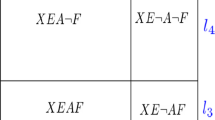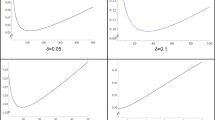Abstract
Subjective Bayesianism is a major school of uncertain reasoning and statistical inference. It is often criticized for a lack of objectivity: (i) it opens the door to the influence of values and biases, (ii) evidence judgments can vary substantially between scientists, (iii) it is not suited for informing policy decisions. My paper rebuts these concerns by connecting the debates on scientific objectivity and statistical method. First, I show that the above concerns arise equally for standard frequentist inference with null hypothesis significance tests (NHST). Second, the criticisms are based on specific senses of objectivity with unclear epistemic value. Third, I show that Subjective Bayesianism promotes other, epistemically relevant senses of scientific objectivity—most notably by increasing the transparency of scientific reasoning.


Similar content being viewed by others
Notes
This means that p(X) = 0 ⇔ q(X) = 0; a property known as absolute continuity of probability measures. Notably, the convergence is uniform, that it, it holds simultaneously for all elements of the probability space.
Sometimes, meta-analysis is supposed to fill this gap, e.g., failure to find significant evidence against the null in a series of experiments counts as evidence for the null. But first, this move does not provide a systematic, principled theory of statistical evidence, and second, it fails to answer the important question how data support the null hypothesis in a single experiment.
Of course, the problem is more general: for both Bayesians and frequentists, the choice of a statistical test demands a lot of subjective judgment. Often, these choices are nontrivial even in simple problems, e.g., in deciding whether to analyze a contingency table with Fisher’s exact test, Pearson’s χ2-test or yet another method.
The use of default priors in Bayesian inference raises a number of interesting philosophical questions (e.g., Sprenger 2012) which go beyond the scope of this paper. That said, for the given (Binomial) dataset, the chosen approach looks adequate.
References
Bem, D.J. (2011). Feeling the future: Experimental evidence for anomalous retroactive influences on cognition and affect. Journal of Personality and Social Psychology, 100(3), 407–425.
Bem, D.J., Utts, J., Johnson, W.O. (2011). Must psychologists change the way they analyze their data? Journal of Personality and Social Psychology, 101(4), 716–719.
Benjamin, D.J. et al. (2017). Redefine statistical significance. Nature Human Behaviour, 1, 6–10.
Bernardo, J.M. (1979). Reference Posterior Distributions for Bayesian Inference. Journal of the Royal Statistical Society. Series B (Methodological), 41, 113–147.
Bernardo, J.M. (2012). Integrated objective Bayesian estimation and hypothesis testing (pp. 1–68). Oxford: (with discussion). Oxford University Press.
Blackwell, D., & Dubins, L. (1962). Merging of Opinions with Increasing Information. The Annals of Mathematical Statistics, 33(3), 882–886.
Bornstein, R. (1989). Exposure and affect: Overview and meta-analysis of research, 1968–1987. Psychological Bulletin, 106, 265–289.
Chase, W., & Brown, F. (2000). General Statistics. New York: Wiley.
Cohen, J. (1988). Statistical Power Analysis for the Behavioral Sciences. Newark/NJ: Lawrence & Erlbaum.
Cohen, J. (1994). The Earth is Round (p<.05). Psychological Review, 49, 997–1001.
Cox, D., & Mayo, D.G. (2010). Objectivity and Conditionality in Frequentist Inference. In Mayo, D. G., & Spanos, A. (Eds.) Error and Inference: Recent Exchanges on Experimental Reasoning, Reliability and the Objectivity and Rationality of Science, chapter 2 (pp. 276–304). Cambridge: Cambridge University Press.
Crupi, V. (2013). Confirmation. In Zalta, E. (Ed.) The Stanford Encyclopedia of Philosophy.
Cumming, G. (2014). The New Statistics: Why and How. Psychological Science, 25, 7–29.
Douglas, H. (2000). Inductive Risk and Values in Science. Philosophy of Science, 67, 559–579.
Douglas, H. (2004). The irreducible complexity of objectivity. Synthese, 138 (3), 453–473.
Douglas, H. (2009). Science, Policy and the Value-Free Ideal. Pittsburgh: Pittsburgh University Press.
Earman, J. (1992). Bayes or Bust? A Critical Examination of Bayesian Confirmation Theory. Cambridge/MA: MIT Press.
Efron, B. (1986). Why isn’t everyone a Bayesian? (with discussion). American Statistician, 40, 1–11.
Fisher, R.A. (1935). The design of experiments. Edinburgh: Oliver & Boyd.
Fisher, R.A. (1956). Statistical methods and scientific inference. New York: Hafner.
Fitelson, B. (2001). Studies in Bayesian Confirmation Theory. PhD thesis, University of Wisconsin–Madison.
Francis, G. (2012). Publication bias and the failure of replication in experimental psychology. Psychonomic Bulletin & Review, 19, 975–991.
Gaifman, H., & Snir, M. (1982). Probabilities Over Rich Languages, Testing and Randomness. The Journal of Symbolic Logic, 47(3), 495–548.
Galak, J., LeBoeuf, R.A., Nelson, L.D., Simmons, J.P. (2012). Correcting the Past: Failures to Replicate Ψ. Journal of Personality and Social Psychology, 103, 933–948.
Gallistel, C.R. (2009). The importance of proving the null. Psychological Review, 116, 439–453.
Gelman, A., & Hennig, C. (2018). Beyond objective and subjective in statistics. Journal of the Royal Statistical Society, Series A.
Gigerenzer, G. (2004). Mindless Statistics. Journal of Socio-Economics, 33, 587–606.
Goodman, S. (1999). Toward Evidence-Based Medical Statistics. 2: The Bayes factor. Annals of Internal Medicine, 130, 1005–1013.
Harding, S. (1991). Whose Science? Whose Knowledge? Thinking from Women’s Lives. Ithaca: Cornell University Press.
Hempel, C.G. (1965). Science and human values. In Aspects of Scientific Explanation. New York: The Free Press.
Howson, C., & Urbach, P. (2006). Scientific Reasoning: The Bayesian Approach, 3rd edn. Open Court: La Salle.
Huber, P.J. (2009). Robust Statistics, 2nd edn. New York: Wiley.
Hyman, R., & Honorton, C. (1986). A joint communiqué: The psi ganzfeld controversy. Journal of Parapsychology, 50, 351–364.
Ioannidis, J.P.A. (2005). Why most published research findings are false. PLoS Medicine, 2, e124.
Jaynes, E.T. (1968). Prior Probabilities. In IEEE Transactions on Systems Science and Cybernetics (SSC-4) (pp. 227–241).
Jaynes, E.T. (2003). Probability Theory: The Logic of Science. Cambridge: Cambridge University Press.
Jeffreys, H. (1961). Theory of Probability, 3rd edn. Oxford: Oxford University Press.
Kass, R.E., & Raftery, A.E. (1995). Bayes Factors. Journal of the American Statistical Association, 90, 773–795.
Lacey, H. (1999). Is Science Value Free? Values and Scientific Understanding. London: Routledge.
Lee, M.D., & Wagenmakers, E.-J. (2013). Bayesian Cognitive Modeling: A Practical Course. Cambridge: Cambridge University Press.
Lehrer, K., & Wagner, C. (1981). Rational Consensus in Science and Society. Dordrecht: Reidel.
Levi, I. (1960). Must the Scientist Make Value Judgments? Journal of Philosophy, 11, 345–357.
Longino, H. (1990). Science as Social Knowledge: Values and Objectivity in Scientific Inquiry. Princeton University Press: Princeton.
Machery, E. (2012). Power and Negative Results. Philosophy of Science, 79, 808–820.
Mayo, D.G. (1996). Error and the growth of experimental knowledge. Chicago: University of Chicago Press.
Mayo, D.G., & Spanos, A. (2006). Severe Testing as a Basic Concept in a Neyman-Pearson Philosophy of Induction. British Journal for the Philosophy of Science, 57, 323–357.
McMullin, E. (1982). Values in Science. In Proceedings of the Biennal Meeting of the PSA (pp. 3–28).
Megill, A. (Ed.). (1994). Rethinking Objectivity. Durham & London: Duke University Press.
Morey, R.D., Rouder, J.N., Verhagen, J., Wagenmakers, E.-J. (2014). Why hypothesis tests are essential for psychological science: a comment on Cumming (2014). Psychological Science, 25(6), 1289–1290.
Moyé, L.A. (2008). Bayesians in clinical trials: Asleep at the switch. Statistics in Medicine, 27, 469–482.
Neyman, J., & Pearson, E.S. (1967). Joint Statistical Papers. Berkeley/CA: University of California Press.
Popper, K.R. (2002). The Logic of Scientific Discovery. Routledge: Reprint of the revised English 1959 edition. Originally published in German in 1934 as “Logik der Forschung”.
Porter, T. (1996). Trust in Numbers: The Pursuit of Objectivity in Science and Public Life. Princeton: Princeton University Press.
Quine, W.V.O. (1992). Pursuit of Truth. Cambridge MA: Harvard University Press.
Reiss, J., & Sprenger, J. (2014). Scientific Objectivity. In The Stanford Encyclopedia of Philosophy.
Richard, F.D., Bond, C.F.J., Stokes-Zoota, J.J. (2003). One hundred years of social psychology quantitatively described. Review of General Psychology, 7, 331–363.
Rosenthal, R. (1979). The file drawer problem and tolerance for null results. Psychological Bulletin, 86(3), 638–641.
Rouder, J.N., Speckman, P.L., Sun, D., Morey, R.D., Iverson, G. (2009). Bayesian t tests for accepting and rejecting the null hypothesis. Psychonomic Bulletin & Review, 16(2), 225–237.
Rouder, J.N. (2011). Morey A Bayes factor meta-analysis of Bem’s ESP claim. Psychonomic Bulletin & Review, 18, 682–689.
Royall, R. (1997). Statistical Evidence: A Likelihood Paradigm. London: Chapman & Hall.
Rudner, R. (1953). The scientist qua scientist makes value judgments. Philosophy of Science, 30, 1–6.
Senn, S. (2011). You may believe you are a Bayesian but you are probably wrong. Rationality, Markets and Morals, 2, 48–66.
Smith, A. (1986). Why isn’t everyone a Bayesian? Comment. American Statistician, 40, 10.
Sprenger, J. (2012). The Renegade Subjectivist: Josė Bernardo’s Reference Bayesianism. Rationality, Markets and Morals, 3, 1–13.
Sprenger, J. (2018). Two impossibility results for measures of corroboration. British Journal for the Philosophy of Science, 69, 139–159.
Staley, K. (2012). Strategies for securing evidence through model criticism. European Journal for Philosophy of Science, 2, 21–43.
Storm, L., Tressoldi, P., Di Risio, L. (2010). Meta-analysis of free response studies 1992–2008: Assessing the noise reduction model in parapsychology. Psychological Bulletin, 136, 471–485.
US Food and Drug Administration. (2010). Guidance for the Use of Bayesian Statistics in Medical Device Clinical Trials. Available at https://www.fda.gov/MedicalDevices/DeviceRegulationandGuidance/GuidanceDocuments/ucm071072.htm.
Utts, J. (1991). Replication and Meta-Analysis in Parapsychology. Statistical Science, 6, 363–403. (with discussion).
Wagenmakers, E.-J., Wetzels, R., Borsboom, D., van der Maas, H.L.J. (2011a). Why Psychologists Must Change the Way They Analyze Their Data: The Case of Psi: Comment on Bem (2011). Journal of Personality and Social Psychology, 100(3), 426–432.
Wagenmakers, E.-J., Wetzels, R., Borsboom, D., van der Maas, H.L.J. (2011b). Yes, Psychologists Must Change the Way They Analyze Their Data: Clarifications for Bem, Utts and Johnson. Available at https://www.ejwagenmakers.com/papers.html.
Wasserman, L. (2004). All of Statistics. New York: Springer.
Wetzels, R., Raaijmakers, J.G.W., Jakab, E., Wagenmakers, E.-J. (2009). How to quantify support for and against the null hypothesis: a flexible WinBUGS implementation of a default Bayesian t test. Psychonomic Bulletin & Review, 16, 752–760.
Wetzels, R., & Wagenmakers, E.-J. (2012). A default Bayesian hypothesis test for correlations and partial correlations. Psychonomic Bulletin & Review, 19, 1057–1064.
Williamson, J. (2010). In Defence of Objective Bayesianism. Oxford: Oxford University Press.
Ziliak, S., & McCloskey, D. (2008). The cult of statistical significance: How the standard error costs us jobs, justice and lives. Ann Arbor: University of Michigan Press.
Author information
Authors and Affiliations
Corresponding author
Rights and permissions
About this article
Cite this article
Sprenger, J. The objectivity of Subjective Bayesianism. Euro Jnl Phil Sci 8, 539–558 (2018). https://doi.org/10.1007/s13194-018-0200-1
Received:
Accepted:
Published:
Issue Date:
DOI: https://doi.org/10.1007/s13194-018-0200-1




